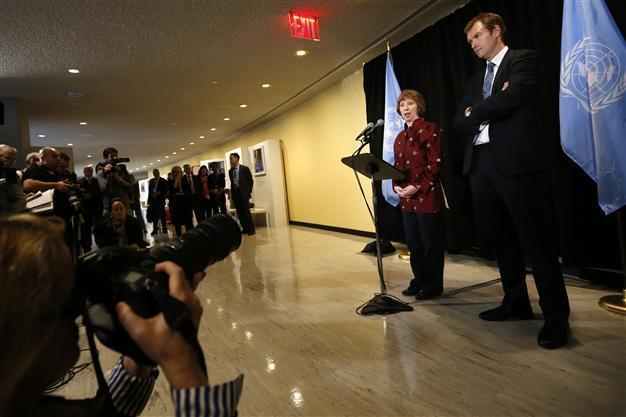US, Iran foreign ministers to hold first nuclear talks
UNITED NATIONS - Agence France-Presse

European Union foreign policy chief Catherine Ashton (L) holds a news conference during the 68th session of the United Nations General Assembly at UN headquarters Sept 23. AP photo
The foreign ministers of arch-rivals, the United States and Iran, will hold their first talks on Iran's contested nuclear drive at a landmark meeting on Thursday, officials said.
Mohammad Javad Zarif, foreign minister in Iran's new government, and U.S. Secretary of State John Kerry will join counterparts from Britain, China, France, Germany and Russia at the meeting at the U.N. headquarters, US officials said.
High level contacts between Iranian and U.S. officials have been rare since the 1979 Iranian Revolution. But in a new sign of a possible thaw, the White House said it was not ruling out a meeting between President Barack Obama and Iran's new President Hassan Rowhani on the sidelines of this week's U.N. General Assembly.
The encounter between Zarif and Kerry, confirmed by US officials -- and arranged for Thursday, according to diplomats -- comes as Iran signals it wants the international community to ease crippling sanctions over its uranium enrichment.
Rowhani said in a U.S. television interview last week that Iran would "never" build a nuclear bomb. But the United States and its allies still believe Tehran wants a bomb capability and are waiting for signs that Rowhani is serious about seeking better relations, diplomats said.
"As we have said previously, we hope that the new Iranian government will engage substantively with the international community to reach a diplomatic solution to Iran's nuclear program," said State Department spokeswoman Jen Psaki.
"We remain ready to work with Iran should the Rowhani administration choose to engage seriously." Kerry "welcomes the foreign minister's commitment to a substantive response" and to meeting with the six major powers, Psaki, added.
Zarif started meetings with western officials in New York on Monday, ahead of the arrival of Rowhani to address the U.N. General Assembly on Tuesday. Catherine Ashton, the European Union's foreign policy chief and the leader of efforts by the major powers to engage with Tehran, said she had "good and constructive" talks with Zarif.
Ashton said that she would meet more formally with Zarif and the two sides' advisers in Geneva in October.
She voiced hope for progress, but played down hopes of a breakthrough.
"I was struck by the energy and determination on the part of the minister," Ashton told reporters. But she added, "As you would appreciate, there is a huge amount of work to do." Thursday's meeting will be a milestone between the United States and Iran, which broke diplomatic relations in 1980 after the overthrow of the late Shah and the taking of US diplomats as hostages.
In 2007 U.S. secretary of state Condoleezza Rice met her Iranian counterpart over an ice cream at an international summit at Sharm El-Sheikh, Egypt in 2007.
Her predecessor, Colin Powell met Iran's foreign minister at the same venue in 2004. But no Iranian minister has taken part in ministerial meetings of the major powers trying to persuade Iran to halt its nuclear drive.
Ben Rhodes, a deputy national security adviser, told reporters that while Obama was not scheduled to meet with Rowhani, it could not be ruled out.
"We are open to engagement with the Iranian government on a variety of levels provided that they will follow through on their commitment to address the international community's concern on their nuclear program," he said.
Obama has pledged to test whether Rowhani, who is considered a moderate within the clerical regime, is serious about resolving Western concerns about Iran's nuclear program.
Obama and Rowhani both sounded upbeat after an exchange of letters.
Western nations remain skeptical about Iran's nuclear intentions however. Israeli Prime Minister Benjamin Netanyahu has also criticized overtures to Rowhani, calling him a "wolf in sheep's clothing" and urging no let-up in pressure.
Zarif, who was educated in the United States and speaks English, is known and respected by Western diplomats.
Greg Thielmann, a senior fellow at the Washington-based Arms Control Association, saw potential signs of progress in jumpstarting diplomacy on Iran.
"You've got all these signals from the Iranians that they are willing and trying to be more constructive," Thielmann said.
Rowhani is speak at the General Assembly late on Tuesday after a meeting with French President François Hollande.
